Overview
We are witnessing a transformative shift in healthcare through the power of automation. Technologies such as AI, robotic surgery systems, remote monitoring, and automated scheduling are not merely enhancements; they are redefining patient care. By improving efficiency and patient outcomes, we are addressing critical challenges that have long plagued the healthcare sector. What’s holding your team back from embracing these advancements?
The integration of these technologies offers significant benefits. For instance, AI-driven solutions can analyze patient data with unprecedented accuracy, leading to more informed clinical decisions. Remote monitoring allows for continuous patient engagement, ensuring timely interventions. Furthermore, automated scheduling optimizes resource allocation, reducing wait times and improving overall satisfaction. These advancements are not just theoretical; they yield measurable outcomes that enhance the quality of care we provide.
As we navigate this complex landscape, we invite you to partner with us in harnessing these innovations. Let’s work together to elevate patient care and streamline operations. Together, we can turn challenges into opportunities for growth and improvement.
Introduction
In the dynamic realm of healthcare, we recognize that automation stands as a transformative force, fundamentally reshaping how we deliver care and engage with patients. Consider the advanced integration platforms that streamline data management or the robotic systems that enhance surgical precision—these technological advancements are not just improving efficiency; they are directly contributing to better patient outcomes.
As we navigate the complexities of a rapidly evolving environment, innovative solutions such as telehealth automation, AI-driven diagnostics, and automated feedback systems emerge as indispensable tools.
This article explores the profound impact of automation across various sectors of healthcare, illustrating how these advancements are optimizing our operations and fostering a more patient-centered approach to care.
What challenges are you facing in adapting to these changes? Let us guide you toward effective solutions that enhance your practice and improve patient experiences.
Avato: Secure Hybrid Integration Platform for Healthcare Automation
At Avato, we recognize the critical need for a hybrid integration platform that securely links various medical systems, facilitating seamless data flow and interoperability. In the medical field, outdated legacy systems can significantly impede operational efficiency. By enabling real-time data exchange, we empower medical providers through automation in healthcare examples to automate processes, minimize errors, and enhance patient outcomes. Our platform’s robust security measures ensure compliance with stringent medical regulations, making it an optimal choice for sensitive environments such as hospitals and clinics.
As we approach 2025, the emphasis on high-quality data remains paramount. Accurate and complete health information exchange is crucial. Our hybrid connection platform maximizes and extends the value of legacy systems, simplifying complex linkages while significantly lowering costs. The combination of medical APIs enhances interoperability, enabling applications to exchange essential data and features. Successful implementations of hybrid integration platforms have shown considerable advancements in care, illustrating how secure integration can lead to improved efficiency in medical services, which include various automation in healthcare examples. As the medical field continues to evolve, our dedication to offering a dependable and secure integration solution establishes us as a leader in automation. We address the urgent need for effective data management and interoperability in 2025. As Slava, a Healthtech CTO, emphasizes, designing efficient software solutions for healthcare is essential, and we are well-equipped to meet these demands.
Da Vinci Surgical System: Revolutionizing Precision in Robotic Surgery
We stand at the forefront of robotic surgery with the Da Vinci Surgical System, revolutionizing the approach to minimally invasive procedures through our advanced technology. By leveraging sophisticated robotics and 3D visualization, we significantly reduce recovery times and minimize the risk of complications. Our surgeons benefit from enhanced dexterity and control, translating into better outcomes for individuals. This automation in healthcare examples optimizes surgical workflows and enhances the overall experience, making procedures less daunting and recovery smoother.
Recent advancements in robotic surgery, particularly with the Da Vinci system, demonstrate that individuals experience shorter recovery times compared to conventional surgical techniques. Current statistics indicate that robotic-assisted surgeries can reduce hospital stays by up to 30%, enabling individuals to return to their daily lives more quickly. Expert opinions underscore our system’s efficacy, with surgeons noting that the precision offered by the Da Vinci platform leads to fewer postoperative complications and faster healing. Mike Yramategui, a Principal Regulatory Engineer, emphasizes that “the standard is sufficiently complex that any new product, even if it is fairly simple, would benefit from this model,” highlighting the importance of regulatory considerations in surgical technology.
Case studies serve as automation in healthcare examples, illustrating the successful implementation of the Da Vinci Surgical System across various healthcare settings and showcasing our ability to enhance surgical outcomes. For instance, hospitals utilizing this technology report a marked improvement in satisfaction scores, attributed to the reduced pain and quicker recovery associated with robotic procedures. Customers like John Johnstone from OSME Pacific and Gustavo Estrada from BC Provincial Health Services Authority have praised us for simplifying complex integration projects, which is crucial for the effective deployment of advanced technologies like the Da Vinci system. As we progress in the field of robotic surgery in 2025, the Da Vinci Surgical System remains a crucial contributor to enhancing surgical methods and bettering individual treatment.
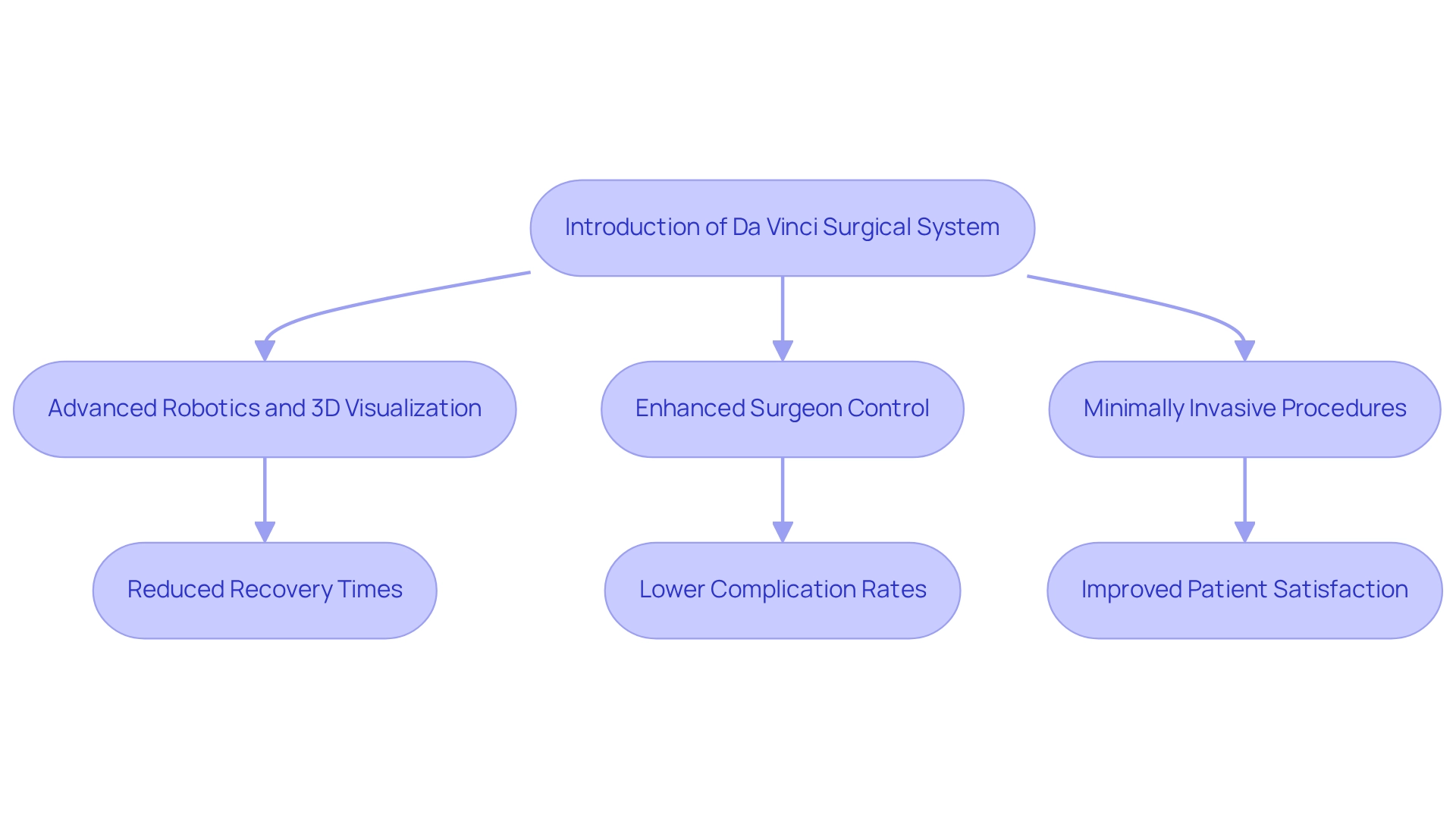
Philips Remote Patient Monitoring: Enhancing Continuous Care for Patients
At Philips, we recognize the critical need for effective health management solutions. Our Remote Monitoring solutions empower healthcare providers to oversee individuals’ health metrics in real-time, enabling proactive management. By seamlessly integrating wearable devices and telehealth platforms, we significantly enhance user engagement, allowing for timely interventions based on actionable data insights. This automation not only decreases hospital readmissions but also enhances satisfaction by ensuring that assistance remains continuous and responsive to individual needs.
Furthermore, the integration of digital medicine, particularly through AI and VR technologies, humanizes care by providing personalized treatment options and enhancing the overall experience. A recent study highlighted that wearable devices for seizure detection achieved a sensitivity of 70.27% and specificity of 86.84%, showcasing their potential in critical health monitoring. In addition, case studies, such as the use of the Muse EEG headband for real-time anxiety monitoring, demonstrate the effectiveness of wearable technology in personalizing healthcare. The use of virtual reality to divert individuals during painful procedures exemplifies how technology can transform experiences.
However, challenges such as data quality, user adherence, and compatibility with existing health systems must be addressed to fully realize the benefits of these technologies. As noted by Karoly et al., noninvasive alternatives to wearable devices, such as tattoos and fabrics, can also contribute to monitoring neurodegenerative diseases, indicating a diverse landscape of technology for tracking individuals. As medical services continue to develop, the incorporation of these advanced monitoring solutions is vital for improving patient outcomes and streamlining clinical processes. We emphasize the essential role of automation in healthcare examples to enhance management, and we invite you to explore how our solutions can transform your healthcare delivery.
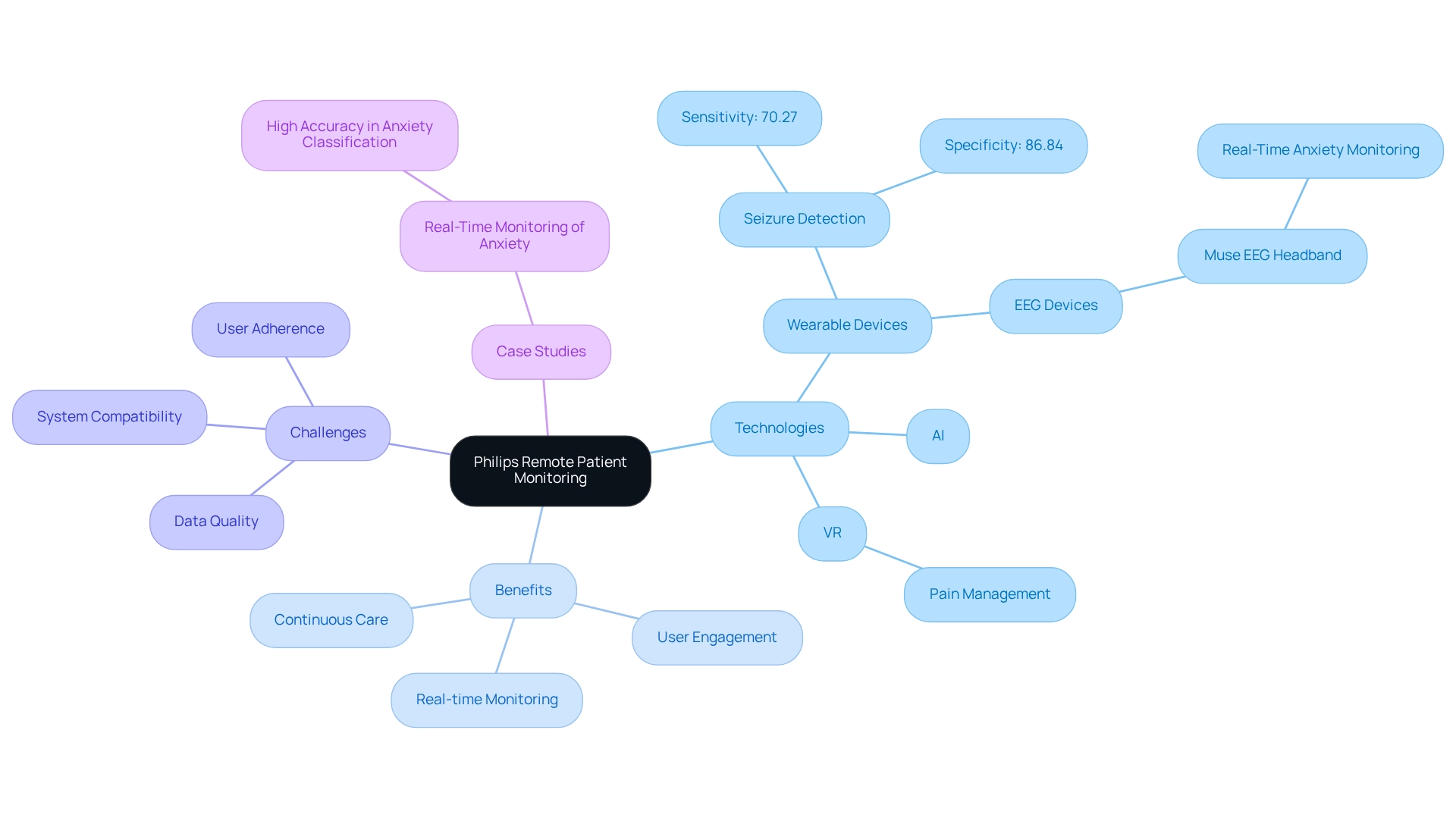
IBM Watson Health: AI-Powered Diagnostic Solutions for Enhanced Accuracy
At IBM Watson Health, we harness the transformative power of artificial intelligence to analyze vast medical data, delivering actionable insights that enhance diagnosis and treatment. In a landscape where 89% of lab professionals recognize the importance of automation in healthcare examples to meet increasing demands amid workforce shortages, our technology significantly improves diagnostic accuracy. This not only streamlines workflows but also illustrates automation in healthcare examples that empower medical professionals to provide personalized support by leveraging comprehensive data evaluations to inform clinical decisions.
Furthermore, the integration of AI in medical services is bolstered by advancements in digital medicine, including virtual reality (VR) and AI-driven interactions, which enhance engagement and personalize patient support. For instance, AI serves as a reliable consultant, equipping patients with comprehensive information about their treatments, thereby fostering their understanding and involvement in their health.
As highlighted in a recent study, AI represents a transformational shift in medical care, akin to previous innovations like the MRI scanner, underscoring the need for essential modifications in clinical practice to fully realize its benefits. Moreover, as Anthony Vecchione notes, ‘AI and value-based services are two of the top buzzwords in the medical field at present,’ highlighting the growing significance of AI in our industry.
While there are perceived risks associated with AI integration, our commitment to validating AI solutions is anticipated to outweigh these concerns, paving the way for further advancements in diagnostics. As AI continues to evolve, we foresee its role in diagnostics expanding, fundamentally altering how medical professionals approach individual treatment.
Zocdoc: Streamlining Patient Appointments with Automation
We are transforming the appointment booking landscape at Zocdoc by enabling individuals to effortlessly schedule visits online. Examples of automation in healthcare significantly alleviate administrative pressures for medical providers, enhancing access to essential services. By offering real-time availability and automated reminders, we effectively reduce no-show rates and streamline scheduling processes. This not only boosts operational efficiency but also enriches the overall experience for individuals, making our services more accessible and responsive to their needs.
As Oliver Kharraz, M.D., our founder and CEO, states, ‘We are proud to work with Headway to help address some of the major pain points — including finding the right provider and simplifying the search for in-network care — around accessing mental health services in the U.S.’ This underscores the critical role of automation in healthcare examples to overcome challenges in accessing care.
Furthermore, as the medical sector progresses towards 2025, we anticipate that the influence of online appointment scheduling platforms like Zocdoc will enhance access and satisfaction for individuals, illustrating the significance of dependable systems. Our commitment to ensuring round-the-clock availability for crucial connections is vital not only in medical fields but also in banking, where operational efficiency and customer service are paramount.
Additionally, advancements in digital medicine, including the application of AI and VR, are transforming care for individuals by offering innovative treatment alternatives that personalize the medical experience. These technologies, in conjunction with our hybrid integration platform, showcase the transformative potential of automation in healthcare examples and data accessibility in improving user experiences across sectors.
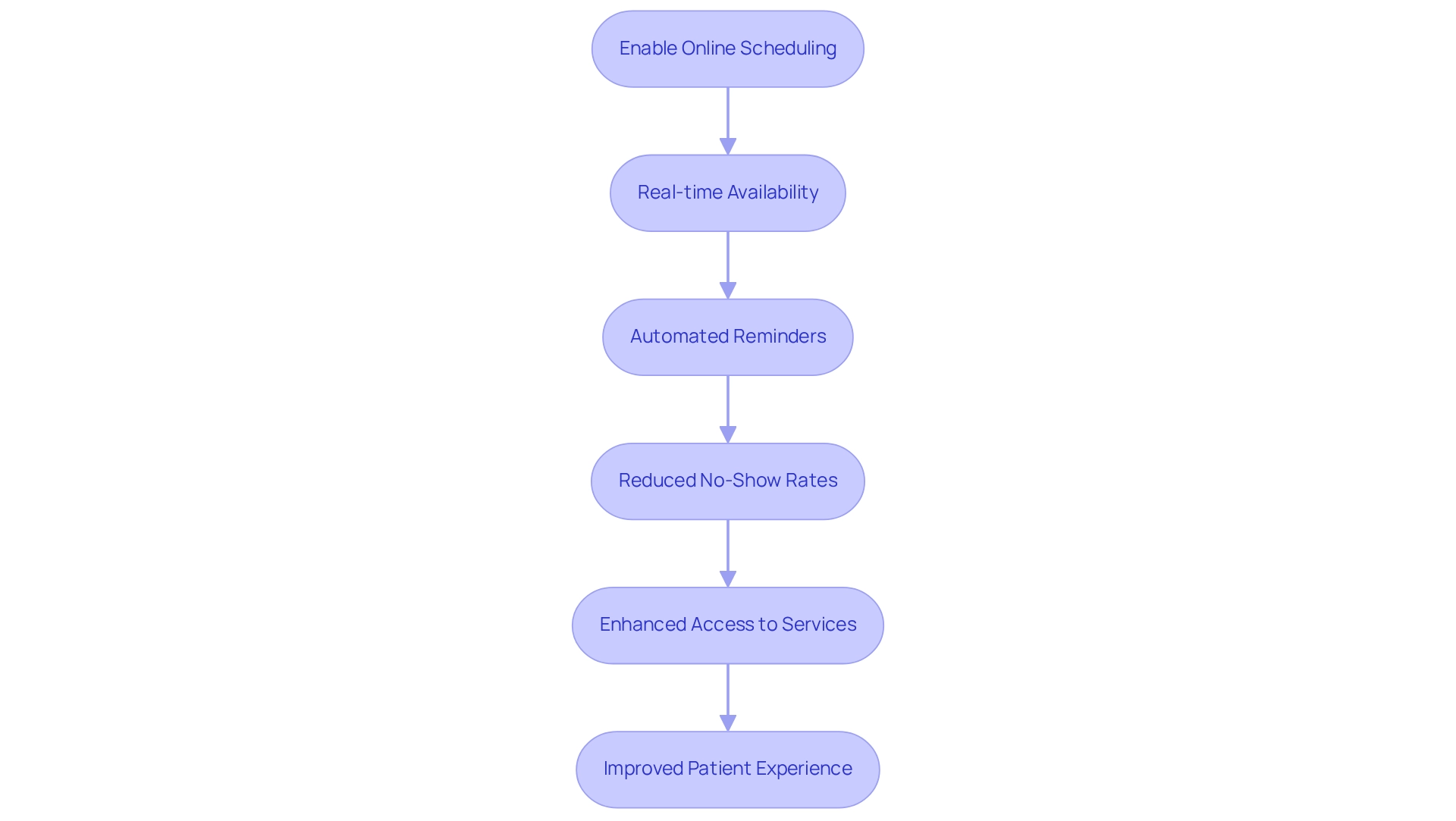
HealthTap: AI Chatbots for Instant Patient Interaction
At HealthTap, we are transforming the way individuals communicate with healthcare providers through the power of AI chatbots. These intelligent systems are meticulously designed to address common health inquiries, facilitate appointment scheduling, and deliver personalized health advice tailored to each client’s unique data. By utilizing automation in healthcare examples, we significantly enhance user engagement, ensuring that individuals receive timely and relevant information. This innovation not only improves the overall accessibility of medical services but also empowers individuals to take a more active role in managing their well-being, ultimately resulting in better health outcomes.
The incorporation of AI in medical services, as exemplified by our applications, underscores a broader movement towards digital medicine. Technologies such as virtual reality (VR) and artificial intelligence (AI) are being utilized to personalize consumer support and enhance treatment alternatives. For instance, VR has demonstrated effectiveness in reducing pain perception in children during medical procedures, showcasing the potential of digital medicine to provide therapeutic benefits with fewer side effects compared to traditional pharmaceuticals. As we approach 2025, medical organizations must strive to maintain a competitive edge, making the integration of automation in healthcare examples crucial. By providing automation in healthcare examples, our AI chatbots not only enhance care for individuals but also assist providers in optimizing operations and lowering expenses, aligning with the industry’s transition towards more efficient and person-centered services. Moreover, with recent leadership shifts, such as Bedrock Security naming George Gerchow as Chief Security Officer, the emphasis on security in automated medical solutions is more pertinent than ever. We are committed to ensuring that individual data remains safeguarded while improving service delivery.
Epic Systems: Automating Electronic Health Records for Better Data Management
We transform the management of electronic health records (EHR) through advanced automation in healthcare examples, allowing medical providers to swiftly access comprehensive individual information. Examples of automation in healthcare streamline workflows and significantly reduce administrative burdens, allowing medical professionals to focus more on patient care. By seamlessly integrating EHRs with various healthcare systems, we ensure that providers have immediate access to critical information, enhancing data accuracy and facilitating improved coordination among healthcare teams.
The integration of digital medicine, particularly through AI and VR technologies, further complements our automation efforts. For instance, AI can serve as a trusted advisor, providing patients with detailed information about their treatments, thereby enhancing the human aspect of care. Consider the SimCoach virtual avatar, which illustrates how AI can provide a compassionate listener to veterans experiencing PTSD, showcasing technology’s potential to personalize medical interactions. Notably, statistics indicate that automating EHRs can decrease administrative tasks by as much as 30%, allowing more valuable time for medical providers. Furthermore, research demonstrates that effective EHR integration can enhance outcomes by improving the speed and accuracy of information sharing. As noted, “An overall perspective on the value of EMRs must therefore include a broader definition of assets and drawbacks,” underscoring the importance of recognizing both the benefits and potential challenges of EHR systems.
Real-world instances reveal that medical organizations using Epic Systems report significant enhancements in treatment, with streamlined processes leading to faster decision-making and improved overall experiences for individuals. However, we acknowledge user experience issues such as system crashes and cumbersome interfaces, indicating a need for improvements in EMR design and functionality. As the medical landscape continues to evolve, the role of automation in healthcare examples, particularly in EHR management, remains pivotal in driving efficiency and enhancing care delivery, especially as we move towards a future where digital medicine plays an increasingly significant role. Additionally, the significance of individual data ownership and accessibility cannot be overlooked, as empowering individuals with control over their health information is crucial for achieving the full potential of these advancements.
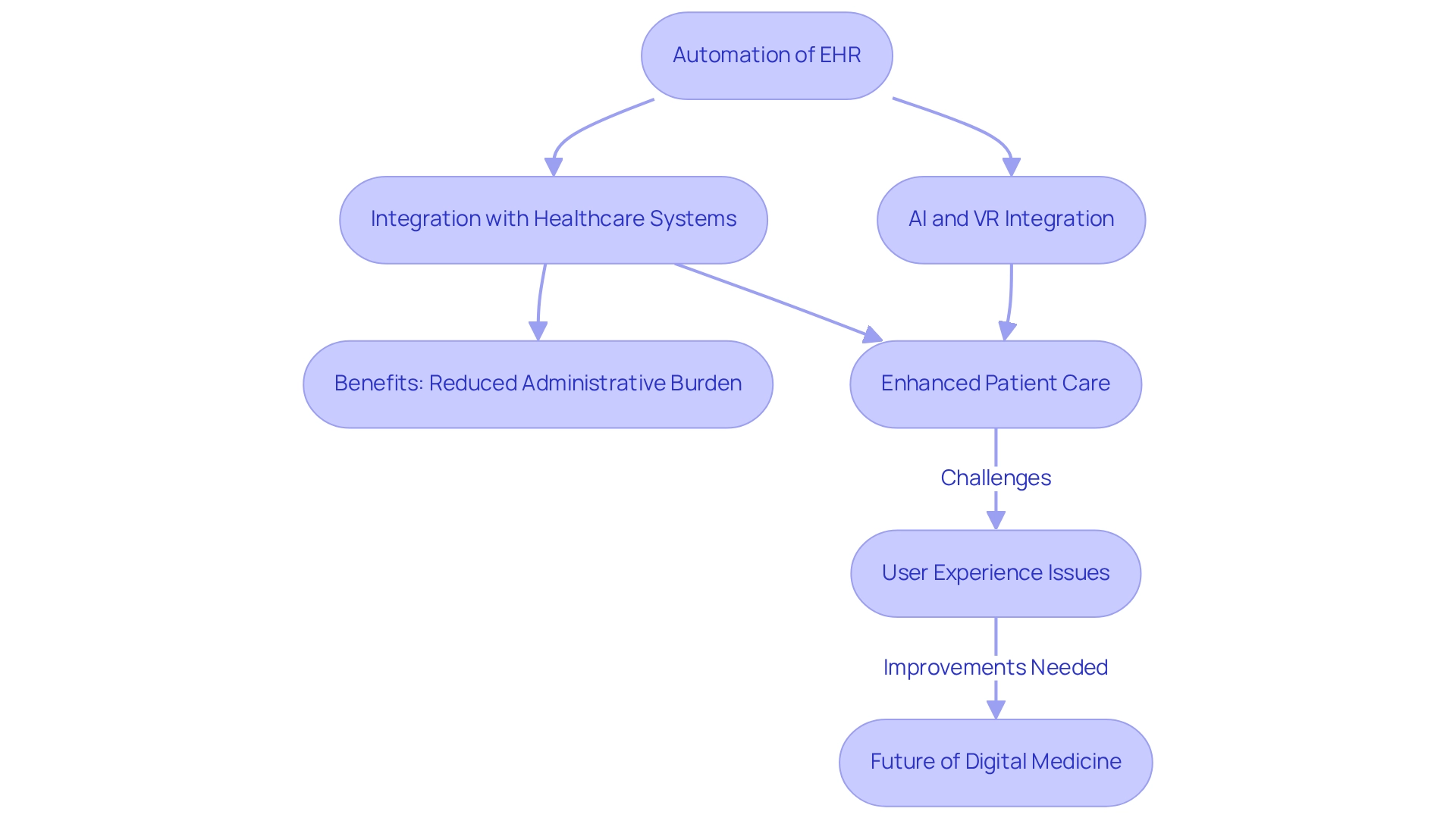
Kareo: Automating Billing Processes for Healthcare Providers
We provide a powerful solution for automation in healthcare examples, effectively streamlining essential tasks such as insurance verification, claim submission, and payment tracking. This automation in healthcare examples significantly reduces errors and accelerates revenue cycles, with studies indicating that these examples of automated administrative practices in medical billing can save providers approximately $166 billion annually. By enhancing operational efficiency, we not only improve cash flow for medical providers but also enrich the patient experience by simplifying billing interactions.
Furthermore, our devoted hybrid linking platform complements our automation solutions by ensuring smooth connectivity between various medical systems, thereby enhancing the overall efficiency of revenue cycle management. Our dedication to simplifying intricate connections enables medical organizations to access isolated resources and generate substantial business value, which is crucial as we explore various automation in healthcare examples in the growing medical automation market.
Gustavo Estrada, a valued customer, noted, “Avato has the ability to simplify complex projects and deliver results within desired time frames and budget constraints,” highlighting the importance of integrated solutions in achieving operational success. With the medical automation market expected to expand notably, the partnership between our automation and unification platforms will be essential for providers aiming to remain competitive and adaptable to evolving demands.
Teladoc Health: Transforming Patient Care with Telehealth Automation
At Avato, we are at the forefront of telehealth automation, revolutionizing healthcare services by simplifying access to medical professionals through our hybrid connection platform. By automating essential processes such as appointment scheduling, follow-ups, and clinical documentation, we not only enhance the efficiency of virtual care delivery but also significantly improve satisfaction among recipients. Recent statistics reveal that utilizing our hybrid connection platform has enabled new employees to start approximately 20% more swiftly, demonstrating a marked enhancement in service efficiency. This allows medical providers to devote more time to patient interactions rather than administrative tasks.
The integration of advanced technologies, including AI and VR, into our solutions exemplifies this transformative shift. These technologies facilitate the automation of clinical documentation and other administrative tasks, alleviating the burdens intensified by workforce shortages. As industry specialists have noted, “The productivity improvements we’ve observed with these technologies are extraordinary,” underscoring the essential role of technology in contemporary medical care.
Practical instances, such as our initiatives to enhance clinical documentation during virtual and in-hospital treatment, serve as automation in healthcare examples that showcase the tangible benefits of telehealth. By addressing the urgent needs of medical providers and individuals alike, we are not only transforming care delivery but also establishing a benchmark for efficiency and satisfaction in telehealth services. This focus on impactful medical innovations grounded in real needs is crucial for tackling the current challenges faced by the industry. Our commitment to architecting the technological foundation necessary to power rich, connected customer experiences is pivotal in this transformation.
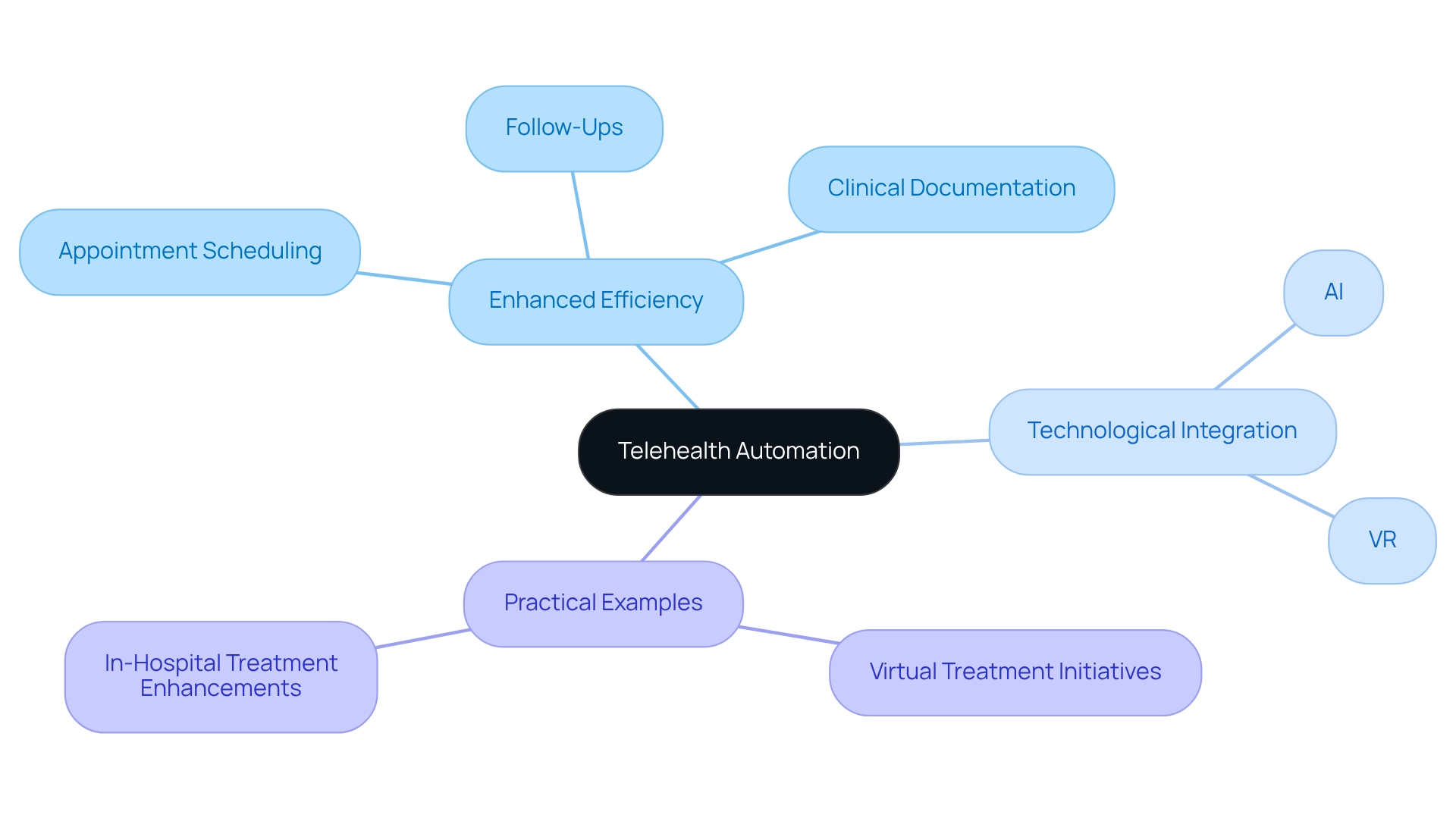
SurveyMonkey: Automating Patient Feedback Collection for Service Enhancement
We recognize that the automation of user feedback gathering is not just a convenience; it is a necessity for medical organizations striving to enhance their service quality. With SurveyMonkey, we provide advanced tools that streamline the survey process, enabling real-time analysis of client experiences and satisfaction levels. This capability allows us to make informed, data-driven decisions that directly improve care for individuals, harnessing the transformative potential of digital medicine.
The importance of real-time feedback analysis cannot be overstated. It empowers organizations to swiftly adapt to changing client expectations, particularly in the aftermath of the COVID-19 pandemic, which has heightened the demands on medical services. Our case study, ‘The Impact of COVID-19,’ illustrates how organizations leveraging SurveyMonkey’s tools effectively addressed concerns, resulting in improved satisfaction rates. This is crucial, especially considering that only 4% of dissatisfied clients are persuaded to stay by promotional offers, underscoring the need for healthcare providers to prioritize genuine feedback over temporary incentives.
Experts agree that automation in healthcare examples, such as the automation of feedback collection, not only boosts operational efficiency but also enriches the overall experience for those receiving care. For instance, Glance reports that customer service representatives request a customer’s name only 21% of the time, highlighting the need for personalization in client interactions. By adopting these automated solutions, we ensure that medical organizations not only meet but exceed client expectations, ultimately leading to better health outcomes and increased trust, as demonstrated by various automation in healthcare examples, which become increasingly vital with the integration of AI and VR technologies that humanize patient care.
We invite you to explore how our tools can help you maintain high service standards and foster patient loyalty in this dynamic environment.
Conclusion
The integration of automation in healthcare is not just a trend; it is fundamentally transforming the landscape of patient care. We are enhancing operational efficiency and improving outcomes across various sectors. From our hybrid integration platform that facilitates seamless data flow to the Da Vinci Surgical System that enhances surgical precision, these advancements are pivotal in addressing the challenges posed by outdated systems and workforce shortages. The implementation of AI-driven tools, like IBM Watson Health and HealthTap’s chatbots, underscores our commitment to leveraging technology to streamline diagnostics and patient interactions, ultimately leading to more personalized care.
Furthermore, remote patient monitoring solutions from Philips and automated billing processes by Kareo exemplify how automation can improve patient engagement and operational workflows. This ensures that healthcare providers can focus on delivering quality care rather than getting bogged down by administrative tasks. The trend towards telehealth automation, as seen in our approach, further emphasizes the need for efficient systems that enhance patient satisfaction and access to services.
As the healthcare industry continues to evolve, the role of automation will become increasingly critical. By embracing these innovative solutions, we address immediate operational challenges while fostering a more patient-centered approach to care. Prioritizing automation allows us to unlock significant value, ultimately leading to enhanced patient experiences and improved health outcomes in this rapidly changing environment. The future of healthcare lies in harnessing the full potential of these technologies, ensuring that both patients and providers benefit from a more efficient and responsive system.

